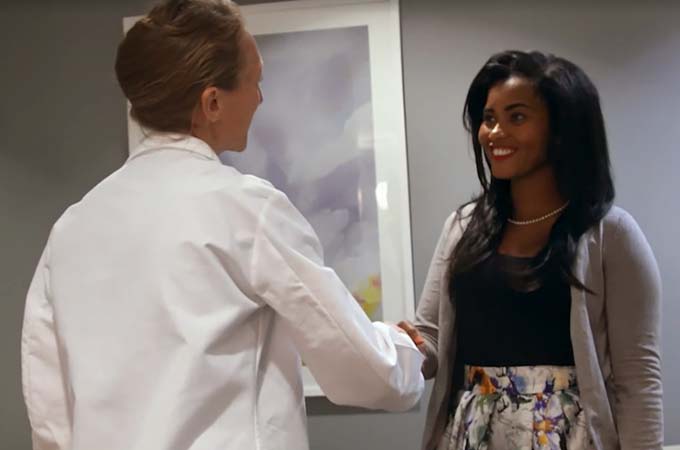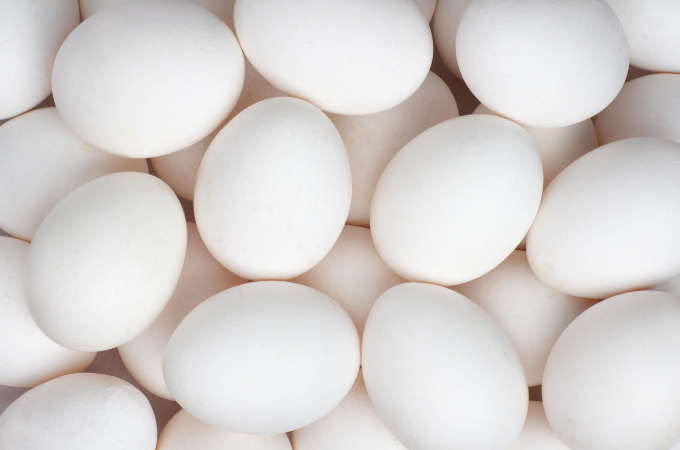Washington Post reporter, filmmaker, and patient of Shady Grove Fertility, takes us through an emotional journey in her quest to take charge of and be proactive about her fertility as she contemplates the important decision of, ‘should I freeze my eggs?’ Her story is captured through a short video docuseries that provides a heart-warming look at her very personable yet relatable journey of research, discovery, and soul-searching.
Dr. Kate Devine, Co-Director of Research and a reproductive endocrinologist at SGF’s K. Street location, is Nicole’s physician. Throughout the series Dr. Devine shares some very helpful information for any woman considering freezing her eggs, including a refresher on how a woman’s reproductive system works and what the ticking of our biological clock really means. “Because women are born with all the eggs they will have, many women think of egg freezing as a way to extend the biological clock, and in many ways that’s accurate,” says Dr. Devine.
As women age, their egg quantity will continue to decrease, and the quality will as well, which can impact one’s ability to conceive. “Chromosomal abnormalities exist when an egg has some other number than 23 chromosomes. If there is any other number, that is considered abnormal. Embryos that are abnormal will not implant or will result in a miscarriage,” adds Devine.
How do you know if you’re the right candidate to freeze your eggs?
In order for a woman to know if she is the right candidate for egg freezing, she will need to complete ovarian reserve testing, which will provide insights into her fertility potential. Nicole’s testing included a simple transvaginal ultrasound and bloodwork to measure various hormone levels. The transvaginal ultrasound counts the small resting (antral) follicles, which is a good predictor of the status of ovarian reserve. The bloodwork measures the FSH (follicle-stimulating hormone), which releases from the brain and stimulates the ovary to recruit and mature an egg. AMH (anti-Müllerian hormone) is the most accurate predictor of a woman’s egg supply. A higher AMH level would indicate a large amount of antral follicles and a strong ovarian reserve where as a lower value may show a decrease in the ovarian reserve.
Interpreting the Ovarian Reserve Testing Results
The results from ovarian reserve testing can help determine a treatment plan and if egg freezing is the right option. When women have a low ovarian reserve, this can often be due to advanced age but can sometimes happen for no known reason. “In Nicole’s situation, because her ovarian reserve was below average for someone 29 years of age, it would not be unreasonable for Nicole to consider preserving her fertility by freezing her eggs,” says Devine.
Making the Emotional Decision to Freeze My Eggs
Making the decision to freeze your eggs can be an emotional decision, but an empowering one. We’ve heard many women describe it as ‘giving a gift to myself.’ Having options in life is something that we all value. Egg freezing allows you to have the option of having a baby later in life, when you’re ready, without the pressure of a ticking biological clock. We make it possible and affordable to preserve your options for when you’re ready.
Making the Financial Decision to Freeze My Eggs
SGF understands the financial and time commitment involved in egg freezing, which is why we have dedicated financial programs designed exclusively for our patients to help make treatment affordable. Should a patient wish to freeze her eggs, there are two components of the total egg freezing cost: the cost of freezing eggs and the cost of using frozen eggs later to have a baby, should the need arise. The decision on how many eggs to freeze and how many cycles to pursue is entirely up to the patient, with guidance from her clinician. Egg freezing is often viewed as a ‘backup plan’ and not all women will need or use their frozen eggs. However, should you need or wish to use your frozen eggs, SGF has developed a 100% money-back guarantee program. Take home a baby or receive a 100% refund.
Does egg freezing really work?
SGF is one of the only fertility centers in the U.S. with published egg freezing pregnancy data from our own cases. In the February 2016 edition of the esteemed medical journal Fertility and Sterility, SGF’s research evaluated pregnancy rates of women who froze their eggs (for either elective or non-elective purposes). This is the largest study in the U.S. that provides pregnancy rates from frozen, non-donor eggs. With this new information, women have a better idea of what to expect from their egg freezing cycles in regard to the probability of taking home one or more children based on her age and number of mature frozen eggs.
What happens next?
Whether Nicole decides to freeze her eggs is a personal decision and one that will require her to weigh the pros and cons of moving forward with the process. We will check back with her this Spring to see what she decides.
A woman’s age is the single most important factor affecting fertility. Being proactive about your fertility will provide you with family building options for the future. The first step is to schedule an appointment with a SGF clinician to see if egg freezing is the right option for you.






